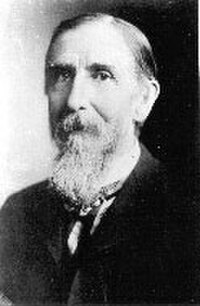Milton Bradley
| Milton Bradley | |
|---|---|
 |
|
| Born |
November 8, 1836 Vienna, Maine, U.S. |
| Died | May 30, 1911 (aged 74) Springfield, Massachusetts, U.S. |
| Occupation | Entrepreneur Boardgame manufacturer |
Milton Bradley (November 8, 1836 – May 30, 1911) was an American business magnate, game pioneer and publisher, credited by many with launching the board game industry, with the Milton Bradley Company.
Born in Vienna, Maine in 1836, to Lewis and Fannie (Lyford) Bradley, Bradley grew up in a working-class household in Lowell, Massachusetts after the family moved there in 1847. After completing high school in 1854 he found work as a draftsman and patent agent before enrolling at the Lawrence Scientific School in Cambridge, Massachusetts. He was unable to finish his studies after moving with his family to Hartford, Connecticut, where he could not find gainful employment. In 1856, he left home and got a job in the locomotive works of the Blanchard & Kimball (later Bemis & Company) in Springfield, Massachusetts.
After the company was shuttered during the recession of 1858, he entered business for himself as a mechanical draftsman and patent agent. In 1859, Bradley went to Providence, Rhode Island to learn lithography and in 1860, he set up the first color lithography shop in Springfield, Massachusetts. He moved forward with an idea he had for a board game which he called The Checkered Game of Life, an early version of what later became The Game of Life.
Bradley's ventures into the production of board games began with a large failure in his lithograph business. When he printed and sold an image of the little-known Republican presidential nominee Abraham Lincoln, Bradley initially met with great success. But a customer demanded his money back because the picture was not an accurate representation—Lincoln had decided to grow his distinctive beard after Bradley's print was published. Suddenly, the prints were worthless, and Bradley burned those remaining in his possession. Looking for a lucrative alternate project, Bradley found inspiration from an imported board game a friend gave him, concluding that he could produce and market a similar game to American consumers. In the winter of 1860, Bradley released The Checkered Game of Life.
...
Wikipedia
